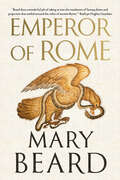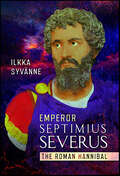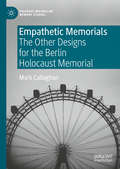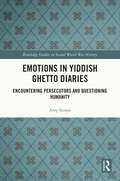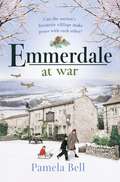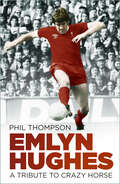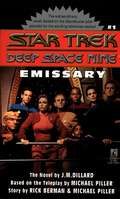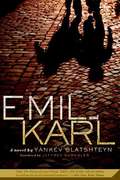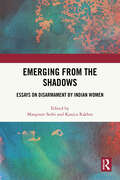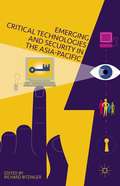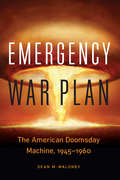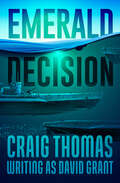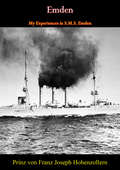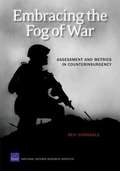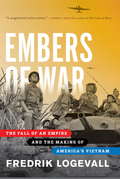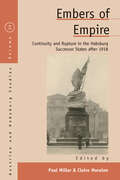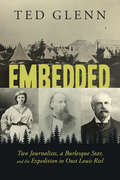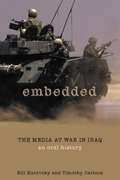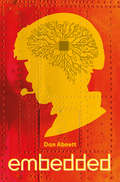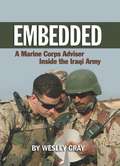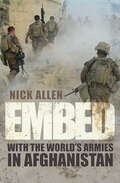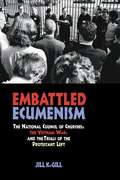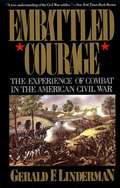- Table View
- List View
Emperor of Rome: Ruling The Ancient Roman World
by Mary BeardINSTANT NEW YORK TIMES BESTSELLER Best Books of 2023: New Yorker, The Economist, Smithsonian Most Anticipated Books of Fall: Washington Post, Los Angeles Times, TODAY, Literary Hub, and Publishers Weekly "A vivid way to re-examine what we know, and don’t, about life at the top.... Emperor of Rome is a masterly group portrait, an invitation to think skeptically but not contemptuously of a familiar civilization." —Kyle Harper, Wall Street Journal A sweeping account of the social and political world of the Roman emperors by “the world’s most famous classicist” (Guardian). In her international bestseller SPQR, Mary Beard told the thousand-year story of ancient Rome, from its slightly shabby Iron Age origins to its reign as the undisputed hegemon of the Mediterranean. Now, drawing on more than thirty years of teaching and writing about Roman history, Beard turns to the emperors who ruled the Roman Empire, beginning with Julius Caesar (assassinated 44 BCE) and taking us through the nearly three centuries—and some thirty emperors—that separate him from the boy-king Alexander Severus (assassinated 235 CE). Yet Emperor of Rome is not your typical chronological account of Roman rulers, one emperor after another: the mad Caligula, the monster Nero, the philosopher Marcus Aurelius. Instead, Beard asks different, often larger and more probing questions: What power did emperors actually have? Was the Roman palace really so bloodstained? What kind of jokes did Augustus tell? And for that matter, what really happened, for example, between the emperor Hadrian and his beloved Antinous? Effortlessly combining the epic with the quotidian, Beard tracks the emperor down at home, at the races, on his travels, even on his way to heaven. Along the way, Beard explores Roman fictions of imperial power, overturning many of the assumptions that we hold as gospel, not the least of them the perception that emperors one and all were orchestrators of extreme brutality and cruelty. Here Beard introduces us to the emperor’s wives and lovers, rivals and slaves, court jesters and soldiers, and the ordinary people who pressed begging letters into his hand—whose chamber pot disputes were adjudicated by Augustus, and whose budgets were approved by Vespasian, himself the son of a tax collector. With its finely nuanced portrayal of sex, class, and politics, Emperor of Rome goes directly to the heart of Roman fantasies (and our own) about what it was to be Roman at its richest, most luxurious, most extreme, most powerful, and most deadly, offering an account of Roman history as it has never been presented before.
Emperor Septimius Severus: The Roman Hannibal
by Ilkka SyvänneOne ancient source called Severus the most warlike of all men who had lived up to that moment in time. The rise of Septimius Severus to power started the dominance of the military in Roman affairs and it was because of this that Septimius’s advice for his sons was nothing less than: 'Be harmonious, enrich the soldiers, and scorn all other men!' Ilkka Syvanne explains in detail how the African Septimius Severus achieved his position, how he won his wars and battles and how he used his newly gained power to secure his family’s position. He reveals how he reformed the state and its military, and how he used these remodeled forces in wars of conquest to prove his worth as emperor to both the soldiers and the populace. This biography offers the first complete overview of the policies, events and military campaigns of Severus' reign in the fullest detail allowed by the sources. It also explains how and why these contributed to the military crisis of the third century and discusses the legacy he left for his son, Caracalla, who followed him in both his good and bad traits.
Empathetic Memorials: The Other Designs for the Berlin Holocaust Memorial (Palgrave Macmillan Memory Studies)
by Mark CallaghanThis book is a study of the Berlin Holocaust Memorial Competitions of the 1990s, with a focus on designs that kindle empathetic responses. Through analysis of provocative designs, the book engages with issues of empathy, secondary witnessing, and depictions of concentration camp iconography. It explores the relationship between empathy and cultural memory when representations of suffering are notably absent. The book submits that one design represents the idea of an uncanny memorial, and also pays attention to viewer co-authorship in counter-monuments. Analysis of counter-monuments also include their creative engagement with German history and their determination to defy fascist aesthetics. As the winning design for The Memorial to the Murdered Jews of Europe is abstract with an information centre, there is an exploration of the memorial museum. Callaghan asks whether this configuration is intended to compensate for the abstract memorial’s ambiguity or to complement the design’s visceral potential. Other debates explored concern political memory, national memory, and the controversy of dedicating the memorial exclusively to murdered Jews.
Emotions in Yiddish Ghetto Diaries: Encountering Persecutors and Questioning Humanity (Routledge Studies in Second World War History)
by Amy SimonThis book uses an empathic reading of Yiddish diarists’ feelings, evaluations, and assessments about persecutors in the Warsaw, Lodz, and Vilna ghettos to present an emotional history of persecution in the Nazi ghettos. It re-centers the daily experiences of psychological and physical violence that made up ghetto life and that ultimately led victims to use their diaries as a place of agency to question and attempt to maintain their own beliefs in pre-war Jewish and Enlightenment ethics and morality. Holocaust scholars and students, as well as people interested in personal narratives, interpersonal relations, and the problem of dehumanization during the Holocaust will find this study particularly thought-provoking. Essentially, this book highlights the benefits of reading with empathy and paying attention to emotions for understanding the experiences of people in the past, especially those facing tragedy and trauma.
Emmerdale at War: an uplifting and romantic read perfect for nights in (Emmerdale, Book 3) (Emmerdale)
by Pamela BellThe perfect Christmas gift full of warmth and nostalgia, for fans of ITV's Emmerdale, and readers who love heartwarming and heartbreaking stories set during World War II.Britain is at war once again and the families of Emmerdale are trying their best to cope with a new way of life.Rationing has been introduced across the country, two million more men have been called up for service, and blackouts, evacuees and military training camps have become the norm. In Beckindale, three young women are about to find their lives changed forever...Annie Pearson is working on Emmerdale Farm, while her love, Edward Sugden is at the front line. Lily Dingle has found purpose in joining the ATS, though she may get more than she bargained for. And Meg Warcup, now teaching at the local school, has taken in two children evacuated from Hull. They've adjusted to their new way of life until one day a German plane comes crashing down in the village... and changes everything in the village of Beckindale.The third novel in the Emmerdale series transports us to the Yorkshire Dales in the midst of World War II, exploring the lives of Emmerdale's much-loved families. Will the nation's favourite village overcome adversity to deal with the loves and lives lost?
Emmerdale at War: an uplifting and romantic read perfect for nights in (Emmerdale, Book 3)
by Pamela BellThe perfect Christmas gift full of warmth and nostalgia, for fans of ITV's Emmerdale, and readers who love heartwarming and heartbreaking stories set during World War II.Britain is at war once again and the families of Emmerdale are trying their best to cope with a new way of life.Rationing has been introduced across the country, two million more men have been called up for service, and blackouts, evacuees and military training camps have become the norm. In Beckindale, three young women are about to find their lives changed forever...Annie Pearson is working on Emmerdale Farm, while her love, Edward Sugden is at the front line. Lily Dingle has found purpose in joining the ATS, though she may get more than she bargained for. And Meg Warcup, now teaching at the local school, has taken in two children evacuated from Hull. They've adjusted to their new way of life until one day a German plane comes crashing down in the village... and changes everything in the village of Beckindale.The third novel in the Emmerdale series transports us to the Yorkshire Dales in the midst of World War II, exploring the lives of Emmerdale's much-loved families. Will the nation's favourite village overcome adversity to deal with the loves and lives lost?
Emlyn Hughes: A Tribute to Crazy Horse
by Phil ThompsonWhether it was a swashbuckling footballer whose style earned him the nickname Crazy Horse, or as a television quiz show captain who rubbed shoulders with royalty, Emlyn Hughes never did things by half. This book looks at the life of the legend who carved out a career for himself in the media.
Emissary (Star Trek: Deep Space Nine #1)
by J.M. DillardAn original novel based on the acclaimed Star Trek TV series! Commander Benjamin Sisko is just recovering from the death of his wife when he is assigned command over the former Cardassian, but new Federation space station, Deep Space Nine. This space station is strategically located not only because of its orbit about Bajor, but also because of its proximity to the only known stable wormhole in the galaxy. After meeting the other Bajoran and Starfleet personnel assigned to the station, including a former Bajoran freedom fighter and a shapeshifter, Sisko finds himself in that very wormhole and in the midst of a metaphysical experience as the alien inhabitants of the wormhole question the concepts of time and love. Sisko, filled with humanistic hubris, begins to explain these experiences, and resolve his painful past.
Emil and Karl
by Yankev Glatshteyn Jeffrey ShandlerThis is a unique work. It is one of the first books written for young readers describing the early days of the event that has since come to be known as the Holocaust. Originally written in Yiddish in 1938, it is one of the most accomplished works of children's literature in this language. It is also the only book for young readers by Glatshteyn, a major American Yiddish poet, novelist, and essayist. Written in the form of a suspense novel, Emil and Karl draws readers into the dilemmas faced by two young boys one Jewish, the other not when they suddenly find themselves without families or homes in Vienna on the eve of World War II. Because the book was written before World War II, and before the full revelations of the Third Reich's persecution of Jews and other civilians, it offers a fascinating look at life during this period and the moral challenges people faced under Nazism. It is also a taut, gripping, page-turner of the first order.
Emerging from the Shadows: Essays on Disarmament by Indian Women
by Manpreet Sethi Kanica RakhraNational security, war and strategy are mostly considered male preserves across the world even when, as professional scholars or policy practitioners, women have made significant contributions. Women voices and the subject of disarmament have been hidden in the shadows of mainstream security discourse for far too long. The book seeks to right-stream these by bringing together writings of women security experts, scholars and diplomats in India on issues of nuclear disarmament and non-proliferation. International efforts towards sustainable nuclear non-proliferation and disarmament are struggling to find the ‘right’ way. This book shifts the focus to the imperative of disarmament with women authors who share their perspectives on what the future for disarmament looks like and where India—a leading voice on disarmament—stands on these issues. The volume explores India’s nuclear disarmament journey; efforts towards and roadblocks in the implementation of nuclear disarmament verification; confidence building and nuclear risk reduction measures as pathways towards disarmament; nuclear energy and proliferation trends; linkage between nuclear non-proliferation and disarmament; and India’s commitment towards the Women, Peace and Security agenda.This volume will be of great interest to students and scholars, researchers, policymakers and members of the diplomatic community, in the fields of security and strategic studies, international relations, politics, disarmament diplomacy and nuclear policy.
Emerging Critical Technologies and Security in the Asia-Pacific
by Richard BitzingerThe proliferation of advanced militarily relevant technologies in the Asia-Pacific over the past few decades has been a significant, and perhaps even alarming, development. This volume addresses how such technologies may affect military capabilities and military advantage in the region.
Emergency War Plan: The American Doomsday Machine, 1945–1960
by Sean M. MaloneyEmergency War Plan examines the theory and practice of American nuclear deterrence and its evolution during the Cold War. Previous examinations of nuclear strategy during this time have, for the most part, categorized American efforts as &“massive retaliation&” and &“mutually assured destruction,&” blunt instruments to be casually dismissed in favor of more flexible approaches or summed up in inflammatory and judgmental terms like &“MAD.&” These descriptors evolved into slogans, and any nuanced discussion of the efficacy of the actual strategies withered due to a variety of political and social factors. Drawing on newly released weapons effects information along with new information about Soviet capabilities as well as risky and covert espionage missions, Emergency War Plan provides a completely new examination of American nuclear deterrence strategy during the first fifteen years of the Cold War, the first such study since the 1980s. Ultimately what emerges is a picture of a gargantuan and potentially devastating enterprise that was understood at the time by the public in only the vaguest terms but that was not as out of control as has been alleged and was more nuanced than previously understood.
Emergency Deep
by Michael DimercurioIslamic terrorists acquire the deadliest submarine in the world
Emerald Decision
by Craig ThomasIn this New York Times–bestselling thriller, the son of a WWII spy delves into an explosive decades-old secret amid tensions between England and Ireland . . . 1940: McBride, an Anglo-Irish spy, discovers a secret nest of Nazi submarines in Guernsey. As a minefield on the Irish coast is breached and German agents flow into the country—a desperate decision must be made in order to prevent the impending invasion in Britain. The consequences are deadly—and the story is kept top secret for decades . . . 1980: McBride&’s American son, an author, starts to dig into the history and mystery surrounding &“the Emerald decision&”—not realizing his own personal connection to it. And even after all these years, certain parties are willing to kill to keep the story a secret—or to exploit it . . . &“The great strength of [Thomas&’s] books lies . . . in the presentation of powerfully exciting bouts of action in authentically realized settings.&” —Reginald Hill, Books and Bookmen Originally published under the pseudonym David Grant
Emden: My Experiences in S.M.S. Emden
by Prinz Franz Joseph von HohenzollernDuring World War I, Franz Joseph Prinz von Hohenzollern served in Germany’s Kaiserliche Marine (Imperial Navy) as the second torpedo officer on the light cruiser SMS Emden at the Battle of Cocos. The SMS Emden had an extraordinary record capturing British ships. This book, which was first published in its English translation in 1928, is a fascinating record of Franz Joseph’s naval service on the SMS Emden.SMS Emden (“His Majesty’s Ship Emden”) was the second and final member of the Dresden class of light cruisers built for the Imperial German Navy (Kaiserliche Marine). Named after the town of Emden, she was laid down at the Kaiserliche Werft (Imperial Dockyard) in Danzig in 1906. Her hull was launched in May 1908, and completed in July 1909. She had one sister ship, Dresden. Like the preceding Königsberg-class cruisers, Emden was armed with ten 10.5 cm (4.1 in) guns and two torpedo tubes.Emden spent the majority of her career overseas in the German East Asia Squadron, based in Tsingtao, in the Kiautschou Bay concession in China. In 1913, she came under the command of Karl von Müller, who would captain the ship during WWI. At the outbreak of hostilities, Emden captured a Russian steamer and converted her into the commerce raider Cormoran. Emden rejoined the East Asia Squadron, after which she was detached for independent raiding in the Indian Ocean. The cruiser spent nearly two months operating in the region and captured nearly two dozen ships. On October 28, 1914, Emden launched a surprise attack on Penang; in the resulting Battle of Penang, she sank the Russian cruiser Zhemchug and the French destroyer Mousquet.The SMS Emden’s extraordinary record capturing British ships resulted in all those who served on her, including Franz Joseph, being given the right to add the ship’s name to the end of their surnames.
Embracing the Fog of War: Assessment and Metrics in Counterinsurgency
by Ben ConnableThe unpredictable counterinsurgency environment challenges centralized, quantitative campaign assessment. A comprehensive examination of the centralized, quantitative approach to assessment, as described inthe literature and doctrine and applied in two primary case studies (Vietnam and Afghanistan), reveals weaknesses and gaps and proposes an alternative process: contextual assessment.
Embers of War: The Fall of an Empire and the Making of America's Vietnam
by Fredrik LogevallThe struggle for Vietnam occupies a central place in the history of the twentieth century. Fought over a period of three decades, the conflict drew in all the world's powers and saw two of them--first France, then the United States--attempt to subdue the revolutionary Vietnamese forces. For France, the defeat marked the effective end of her colonial empire, while for America the war left a gaping wound in the body politic that remains open to this day. How did it happen? Tapping into newly accessible diplomatic archives in several nations and making full use of the published literature, distinguished scholar Fredrik Logevall traces the path that led two Western nations to lose their way in Vietnam. Embers of War opens in 1919 at the Versailles Peace Conference, where a young Ho Chi Minh tries to deliver a petition for Vietnamese independence to President Woodrow Wilson. It concludes in 1959, with a Viet Cong ambush on an outpost outside Saigon and the deaths of two American officers whose names would be the first to be carved into the black granite of the Vietnam Veterans Memorial. In between come years of political, military, and diplomatic maneuvering and miscalculation, as leaders on all sides embark on a series of stumbles that makes an eminently avoidable struggle a bloody and interminable reality. Logevall takes us inside the councils of war--and gives us a seat at the conference tables where peace talks founder. He brings to life the bloodiest battles of France's final years in Indochina--and shows how from an early point, a succession of American leaders made disastrous policy choices that put America on its own collision course with history: Harry Truman's fateful decision to reverse Franklin Delano Roosevelt's policy and acknowledge France's right to return to Indochina after World War II; Dwight Eisenhower's strenuous efforts to keep Paris in the fight and his escalation of U.S. involvement in the aftermath of the humiliating French defeat at Dien Bien Phu; and the curious turnaround in Senator John F. Kennedy's thinking that would lead him as president to expand that commitment, despite his publicly stated misgivings about Western intervention in Southeast Asia. An epic story of wasted opportunities and tragic miscalculations, featuring an extraordinary cast of larger-than-life characters, Embers of War delves deep into the historical record to provide hard answers to the unanswered questions surrounding the demise of one Western power in Vietnam and the arrival of another. This book will become the definitive chronicle of the struggle's origins for years to come.Advance praise for Embers of War "Fredrik Logevall has gleaned from American, French, and Vietnamese sources a splendid account of France's nine-year war in Indochina and the story of how the American statesmen of the period allowed this country to be drawn into the quagmire."--Neil Sheehan, author of A Bright Shining Lie, winner of the Pulitzer Prize and the National Book Award "Fredrik Logevall is a wonderful writer and historian. In his new book on the origins of the American war in Vietnam, he gives a fascinating and dramatic account of the French war and its aftermath, from the perspectives of the French, the Vietnamese, and the Americans. Using previously untapped sources and a deep knowledge of diplomatic history, Logevall shows to devastating effect how America found itself on the road to Vietnam."--Frances FitzGerald, author of Fire in the Lake, winner of the Pulitzer Prize and the National Book Award
Embers of Empire: Continuity and Rupture in the Habsburg Successor States after 1918 (Austrian and Habsburg Studies #22)
by Paul Miller Claire MorelonThe collapse of the Habsburg Monarchy at the end of World War I ushered in a period of radical change for East-Central European political structures and national identities. Yet this transformed landscape inevitably still bore the traces of its imperial past. Breaking with traditional histories that take 1918 as a strict line of demarcation, this collection focuses on the complexities that attended the transition from the Habsburg Empire to its successor states. In so doing, it produces new and more nuanced insights into the persistence and effectiveness of imperial institutions, as well as the sources of instability in the newly formed nation-states.
Embedded: Two Journalists, a Burlesque Star, and the Expedition to Oust Louis Riel
by Ted GlennA first-hand chronicle of Wolseley’s expedition to end Riel’s Red River Rebellion by a remarkable trio embedded on the mission. In the spring of 1870, two reporters set off from Toronto to cover one of the biggest stories in Canadian history: Colonel Garnet Wolseley’s 1870 expedition to Red River. Over the course of six months, the Daily Telegraph’s Robert Cunningham and the Globe’s Molyneux St. John brought readers along as they paddled and portaged alongside the expedition’s 1,100 troops and 400 voyageurs and guides from the shores of Lake Superior to Fort Garry.But that’s not the whole story. Buried well below the fold was the fact that St. John’s wife — international burlesque star Kate Ranoe — accompanied him and the expedition, and not just as an adventurer. Owing to an accident early on, Ranoe ended up ghostwriting many of St. John’s stories. Embedded is the remarkable story of two reporters and one extraordinary woman as they journeyed to Red River with Colonel Garnet Wolseley and his expeditionary force.
Embedded: The Media At War in Iraq
by Bill Katovsky Timothy Carlson<P>EMBEDDED is a collection of deeply emotional and highly personal accounts of covering the Iraq War. Many of the world's top war correspondents and photographers speak candidly about life on the battlefield. Here are articulate and heartfelt descriptions of fear and firefights, of bullets and banalities, of risking death and meeting deadlines. <P>With over sixty interviews conducted in Kuwait and Iraq shortly after many returned home, Katovsky and Carlson allowed these journalists to step outside their professional role as journalists and examine the lethal allure of combat reporting. <P>Here is CBS Evening News correspondent Jim Axelrod discussing the perils of racing to Baghdad while despondent over the death of a television colleague and being unexpectedly comforted by ABC News Nightline's Ted Koppel; Newsweek reporter Scott Johnson unwittingly driving into an ambush and then kicking out the windshield of his bullet-riddled car to escape the Iraqi gunmen; New York Times Baghdad Bureau Chief John Burns's brave refusal to be intimidated by his Iraqi information ministry minders; and many, many more. <P>Each interview in EMBEDDED maps its own personal path and narrative arc, while presenting an emotional window to war and reporting. Taken individually, each offers a unique view of the most-covered war in history. Collectively, EMBEDDED is an eyewitness to history that will do for the war in Iraq what Michael Herr's Dispatches did for Vietnam.
Embedded
by Dan AbnettHE'D DO ANYTHING TO GET A STORY. When journalist Lex Falk gets himself chipped into the brain of a combat soldier, he thinks he has the ultimate scoop - a report from the forbidden front line of a distant planetary war, live to the living rooms of Earth. When the soldier is killed, however, Lex has to take over the body and somehow get himself back to safety once more... broadcasting all the way.Heart-stopping combat science fiction from the million-selling Warhammer 40,000 author.File Under: Science Fiction [ Future Warefare | Chipped-In | Anything For a Story | Get Out Alive! ]From the Paperback edition.
Embedded
by Wesley R. GrayIn 2006, 1st Lt. Wesley Gray was deployed as a U.S. Marine Corps military adviser to an Iraqi Army battalion in the Haditha Triad. For 210 days, he lived and fought beside Iraqi soldiers in the most dangerous and austere province of western Iraq. Al-Anbar was filled with an insurgent population traumatized by a recent massacre of twenty-four men, women, and children shot at close range by U.S. Marines in retaliation for the death of one of their comrades in a roadside bombing. Despite the high tensions created by the shootings, Gray was able to form a bond with the Iraqis because he had an edge that very few U.S. service members possess -the ability to communicate in Iraqi Arabic. His language skills and his understanding of the culture led the Iraqi soldiers to call him a brother and fondly name him Jamal. By the end of his tour he was a legend within the Iraqi Army. Gray draws on the brutally honest and detailed record he kept during his tour, including extensive interviews with Iraqi soldiers and citizens. He offers a comprehensive portrait of the struggles of the Iraqi people to make their country a nation once again and includes a compelling report on the status and prospects of the U.S. government's strategy for success in Iraq.
Embed: To the End With the World's Armies in Afghanistan
by Nick AllenIn 2007, journalist Nick Allen quit a secure job in Pakistan as a news agency writer to experience the life of foreign troops fighting the Taliban in Afghanistan. Over several years he journeyed as an embedded reporter with a dozen armies, working his way through placid backwaters to remote, savage hotspots where daily clashes with insurgent forces were the norm.Driven by a desire to himself live and then convey some of the drama, tragedy, farce and sheer frustration experienced by soldiers and marines from California to Copenhagen, Allen returned again and again for ‘embeds’ with different contingents to explore a multinational effort that will surely define NATO’s future and events in South Asia, and the world, for many years to come. No other writer managed to gain such broad access to the forty-two-country Coalition that was deployed in Afghanistan, or produce an account that carries so much of the essence of soldiering in this inhospitable environment, where extremes of climate, treachery and enemy cunning have always defeated nations that dared to wage war in the ‘graveyard of empires.’Embed explores the fragile calm of Bamiyan and its ancient sites and other low-intensity regions – usually ignored but a vital part of the overall picture – together with the ferocious clashes of Helmand, Kandahar, Kunar and other provinces. The author found that even the most sophisticated armed forces had been sucked into a fight they were ill-prepared for and, amid political uncertainty and dwindling public support back home, ultimately could not win.
Embattled Ecumenism: The National Council of Churches, the Vietnam War, and the Trials of the Protestant Left
by Jill K. GillThe Vietnam War and its polarizing era challenged, splintered, and changed The National Council of the Churches of Christ in the U. S. A. (NCC), which was motivated by its ecumenical Christian vision to oppose that war and unify people. The NCC's efforts on the war exposed its strengths and imploded its weaknesses in ways instructive for religious institutions that bring their faith into politics. Embattled Ecumenism explores the ecumenical vision, anti-Vietnam War efforts, and legacy of the NCC. Gill's monumental study serves as a window into the mainline Protestant manner of engaging political issues at a unique time of national crisis and religious transformation. In vibrant prose, Gill illuminates an ecumenical institution, vision, and movement that has been largely misrepresented by the religious right, dismissed by the secular left, misunderstood by laity, and ignored by scholars outside of ecumenical circles. At a time when the majority of scholarly work is committed to looking at the religious right, Gill's groundbreaking study of the Protestant Left is a welcome addition. Embattled Ecumenism will appeal to scholars of U. S. religion, politics, and culture, as well as historians of evangelicalism and general readers interested in U. S. history and religion.
Embattled Courage: The Experience of Combat in the American Civil War
by Gerald F. LindermanLinderman traces each soldier's path from the exhilaration of enlistment to the disillusionment of battle to postwar alienation. He provides a rare glimpse of the personal battle that raged within soldiers then and now.
